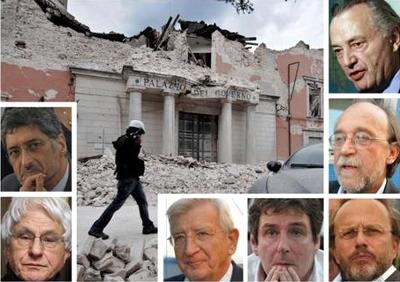words by Carol King
An Italian court found six Italian scientists and an ex-government official guilty of manslaughter over the earthquake in L’Aquila, Abruzzo in 2009.
The seven men were sentenced to six years in prison. The defence asserted there is no way to predict major earthquakes, while the prosecution said the accused gave “false assurances” regarding the dangers facing the city before the earthquake.
Some 400 tremors were felt in the area in the months preceding the 6.3 magnitude earthquake that killed 309 people when it destroyed the town’s historic centre. The information the experts provided regarding the possibility of an earthquake a week before the tragedy was held to be “inaccurate, incomplete and contradictory”. Locals were reported to have been reassured by the optimistic information given.
The judge ordered the convicted men to pay court costs and damages, and banned them from holding public office again. The men are all members of Italy’s National Commission for the Forecast and Prevention of Major Risks. They include some of Italy’s top seismologists and geological experts. Under the Italian legal system, the men have the right to appeal.
The case has alarmed the world’s scientific community. Scientists fear that the legal judgment will deter experts from sharing their knowledge about natural hazards for fear of possible lawsuits. In June 2010, the American Association for the Advancement of Science, the world’s largest multi-disciplinary society, wrote to President Giorgio Napolitano to express its concern over the men’s indictment, saying the “charges against these scientists are both unfair and naïve.”
The judgment comes at a time when more than 40% of the staff at Italy’s National Institute for Geophysics and Volcanology face uncertainty because of cuts under rationalisations being considered by the government in its spending review.









